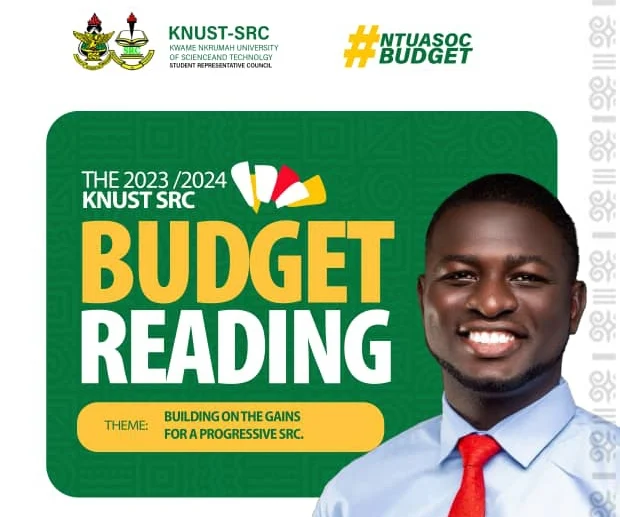In a recent parliamentary session, Master Kelvin Ohenaku, Financial Secretary of the KNUST SRC, presented the long-awaited 2023/2024 budget. However, the delay in this presentation has sparked numerous concerns among the student body, particularly regarding the administration led by Yvonne-Nkay.
Amidst the buzz surrounding the budget, a specific pledge
caught the attention of students: the commitment to purchase the 'History of
Ashanti' book for GH₵ 10,000. This raised eyebrows as it occurred without a
formal budget presentation, leaving students questioning the transparency and
funding source behind such initiatives.
Post the reading of the 2023/2024 budget, the KNUST SRC Parliamentary Council engaged in a heated debate, with many members expressing vehement objections. A prevailing sentiment among parliamentarians was that the presented budget lacked validity and would not be accepted in its current form.
Parliamentarians contended that the budget, which is set to utilize the funds of 80,000 students, faced significant flaws. Notably, the budget document lacked essential elements, such as the SRC letterhead, and omitted the names and signatures of both the SRC President and the Financial Secretary. These omissions raised concerns about the formality and authenticity of the document.
The debate further highlighted procedural irregularities, as
the budget reportedly did not undergo timely review by the Budget and Finance
Committee. Additionally, students were inadequately informed about the budget
presentation, leading to a lack of participation and awareness among the
general student populace.
One of the paramount concerns voiced during the debate was the absence of precise figures in the budget. Parliamentarians noted that the budget failed to specify the exact amounts allocated for various SRC activities during the 2023/2024 academic year. In light of these controversies, the Parliament urged the Financial Secretary and his committee to revisit and revise the budget, addressing the identified shortcomings. The unfolding developments add layers of complexity to the SRC's financial planning, leaving both parliamentarians and students eager for greater transparency and clarity in the budgetary process.
Following the vigorous debate over the validity and transparency of the 2023/2024 budget, the Speaker of the KNUST SRC Parliament made a crucial decision. The Speaker officially adjourned the parliamentary sitting, signaling a temporary halt to the deliberations surrounding the budget. An agreement emerged following the election, determining that the SRC would undertake a revision of the budget and submit it for approval. Additionally, all expenditures are to be temporarily suspended until the new budget undergoes scrutiny and receives official approval.
Some Key Highlights from the Rejected Budget:
1. Retrospective Analysis:
The budget kicks
off with a reflective overview, providing insights into the allocations of the
last two years and setting the stage for a comprehensive forecast for the
academic year.
2. Strategic Allocation for Continuity:
An innovative addition is the allocation of 40% for
retention, with 20% earmarked for the next administration and an additional 20%
designated as contingency for unforeseen emergencies.
3. Focus on Projects and Welfare:
The 2023/2024 budget focuses on financing ten new projects
while continuing the initiatives from the previous administrations,
demonstrating a commitment to sustainable development.
4. Student Investment and Budget Size:
Underlining a
substantial investment, the ordinary student contributes GHC 9.50 out of GHC
22.05 toward SRC budget expenditure. This budget is hailed as the most
significant investment in projects and welfare in the last decade.
Strategic Reforms and Accountability:
5. Ad Hoc Committee Establishment:
The establishment
of an Ad Hoc Committee signifies a paradigm shift towards a more accountable,
transparent, and student-centered SRC. This reform aims to redefine how
projects are proposed, evaluated, and executed.
Support for Parliamentary Council:
6. Enhanced Funding for Parliamentary Council:
The allocation for
the Parliamentary Council witnesses an 85% increase from 2021/2022 and 80% from
2022/2023, underscoring the SRC's belief in the council's ability to drive
meaningful change.
Welfare-Centric Allocations:
7. Diverse Welfare Support:
A significant 56%
of the total budget is designated for supporting the welfare needs of students
across colleges, the Obuasi campus, and both residential and non-residential
constituencies, ensuring inclusivity and equity.
Strategic Reductions for Prioritization:
8. Budget Adjustments for Efficiency:
A reduction of GHC
83,000 in allocations for various offices, activities, and programs reflects a
strategic move to optimize resource allocation and enhance fiscal
responsibility.
Innovative Initiatives:
9. Mental Health E-Counselling App:
Acknowledging the
importance of mental health, the SRC allocates resources for a partnership to
develop an E-Counselling App, providing confidential access to professional
counseling services.
10. Expansion of KBN and Fee Support:
Negotiations for
expanding the KBN initiative to support tuition fees of less-endowed students
are in advanced stages, with an allocation of GHC 60,000 demonstrating a
commitment to removing financial barriers.
11. Investment in the KNUST Food Bank:
A substantial
increase in funding for the KNUST Food Bank aims to cater to the daily
nutritional needs of approximately 150 less-endowed students throughout the
academic year.
Educational Empowerment:
12. SRC Weekend School Program:
The SRC Weekend
School Program introduces practical knowledge and skills in high-demand areas,
extending learning opportunities beyond conventional classrooms.
Join us on Telegram, Whatsapp Page


